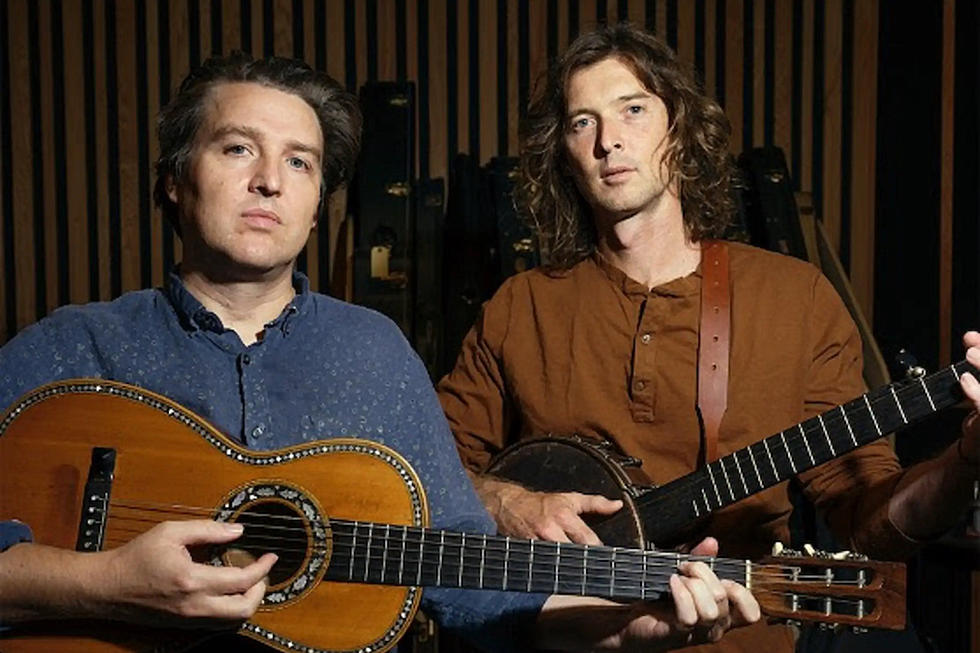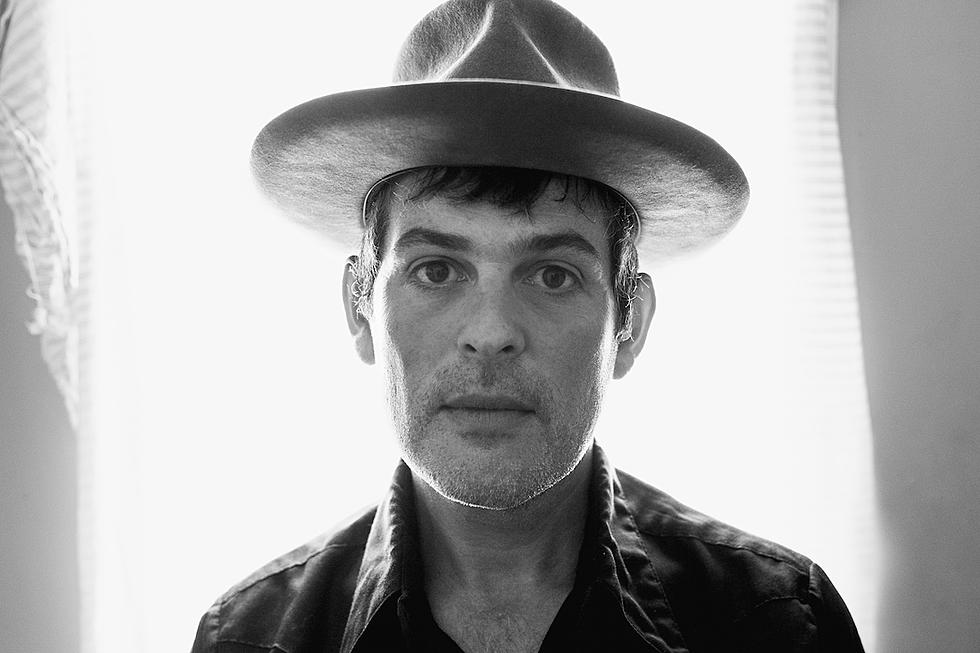Doc Watson Dead: Folk Legend and Guitar Pioneer Dies at 89
RALEIGH, N.C. -- Doc Watson, the blind Grammy-award winning folk musician whose mountain-rooted sound was embraced by generations and whose lightning-fast style of flatpicking influenced guitarists around the world, died Tuesday at a North Carolina hospital, according to a hospital spokeswoman and his manager. He was 89.
Watson died at Wake Forest Baptist Medical Center in Winston-Salem, where he was hospitalized recently after falling at his home in Deep Gap, in the Blue Ridge Mountains. He underwent abdominal surgery while in the hospital and had been in critical condition for several days.
Arthel "Doc" Watson's mastery of flatpicking helped make the case for the guitar as a lead instrument in the 1950s and 1960s, when it was often considered a backup for the mandolin, fiddle or banjo. His fast playing could intimidate other musicians, even his own grandson, who performed with him.
Richard Watson said in a 2000 interview with The Associated Press that his grandfather's playing had a humbling effect on other musicians.
"Everybody that's picked with you says you intimidate them, and that includes some of the best," Richard Watson told him.
The ever-humble Doc Watson found it hard to believe.
Country and bluegrass singer Ricky Skaggs said Tuesday evening, "An old ancient warrior has gone home."
"He prepared all of us to carry this on," Skaggs added. "He knew he wouldn't last forever. He did his best to carry the old mountain sounds to this generation."
Musicians Who Died in 2012
%VIRTUAL-Gallery-155870%
Doc Watson was born March 3, 1923, in Deep Gap, about 100 miles northwest of Charlotte. He lost his eyesight by the age of 1 when he developed an eye infection that was worsened by a congenital vascular disorder, according to a website for Merlefest, the annual musical gathering named for his late son Merle.
He came from a musical family. His father was active in the church choir and played banjo and his mother sang secular and religious songs, according to a statement from Folklore Productions, his management company since 1964.
Doc Watson's father gave him a harmonica as a young child, and by 5 he was playing the banjo, according to the Merlefest website. He learned a few guitar chords while attending the North Carolina Morehead School for the Blind in Raleigh, and his father helped him buy a Stella guitar for $12.
"My real interest in music was the old 78 records and the sound of the music," Doc Watson is quoted as saying on the website. "I loved it and began to realize that one of the main sounds on those old records I loved was the guitar."
The wavy-haired Watson got his musical start in 1953, playing electric lead guitar in a country-and-western swing band. His road to fame began in 1960 when Ralph Rinzler, a musician who also managed Bill Monroe, discovered Watson in North Carolina. That led Watson to the Newport Folk Festival in 1963 and his first recording contract a year later. He went on to record 60 albums, and wowed fans ranging from `60s hippies to fans of traditional country and folk music.
According to the Encyclopedia of Country Music, Watson took his nickname at age 19 when someone couldn't pronounce his name and a girl in the audience shouted "Call him Doc!"
Seven of his albums won Grammy awards; his eighth Grammy was a lifetime achievement award in 2004. He also received the National Medal of the Arts from President Bill Clinton in 1997.
"There may not be a serious, committed baby boomer alive who didn't at some point in his or her youth try to spend a few minutes at least trying to learn to pick a guitar like Doc Watson," Clinton said at the time.
Folklore described Watson as "a powerful singer and a tremendously influential picker who virtually invented the art of playing mountain fiddle tunes on the flattop guitar."
Countless guitarists have tried to emulate Watson's renditions of songs such as "Tennessee Stud," "Shady Grove," and "Deep River Blues."
Doc Watson Performs Tennessee Stud
Doc Watson's son Merle began recording and touring with him in 1964. But Merle Watson died at age 36 in a 1985 tractor accident, sending his father into deep grief and making him consider retirement. Instead, he kept playing and started Merlefest, an annual musical event in Wilkesboro, N.C., that raises money for a community college there and celebrates "traditional plus" music.
"When Merle and I started out we called our music `traditional plus,' meaning the traditional music of the Appalachian region plus whatever other styles we were in the mood to play," Doc Watson is quoted as saying on the festival's website. "Since the beginning, the people of the college and I have agreed that the music of MerleFest is `traditional plus.'"
Doc Watson has said that when Merle died, he lost the best friend he would ever have.
He also relied on his wife, Rosa Lee, whom he married in 1947.
"She saw what little good there was in me, and there was little," Watson told the AP in 2000. "I'm awful glad she cared about me, and I'm awful glad she married me."
In a PBS NewsHour interview before a January appearance in Arlington, Va., Watson recalled his father teaching him how to play harmonica to a tune his parents had sung in church, as well as his first bus trip to New York City to perform in the early 1960s. He gave an early solo performance at Gerde's Folk City in Greenwich Village, a hot spot for the folk music revival, and later played Carnegie Hall.
Telling the stories in a folksy manner, he broke into a quiet laugh at various points. He said he still enjoyed touring.
"I love music and love a good audience and still have to make a living," Watson said. "Why would I quit?"
Musician Sam Bush, who has performed at every Merlefest, began touring with Doc and Merle Watson in 1974, occasionally substituting for Merle when he couldn't travel.
"I would sit next to Doc, and I would be influenced by his incredible timing and taste," Bush said after Watson's recent surgery. "He seems to always know what notes to play. They're always the perfect notes. He helped me learn the space between the notes (are) as valuable as the ones you play."
Bush said he was also intimidated when he began playing with the man he calls "the godfather of all flatpickers."
"But Doc puts you at ease about that kind of stuff," Bush said. "I never met a more generous kind of musician. He is more about the musical communication than showing off with hot licks."
His blindness didn't hold him back musically or at home.
Joe Newberry, a musician and spokesman for the N.C. Department of Cultural Resources, remembered once when his wife called the Watson home. Rosa Lee Watson said her husband was on the roof, replacing shingles. His daughter Nancy Watson said her father built the family's utility shed.
Guitarist Pete Huttlinger of Nashville, Tenn., said Doc Watson made every song his own, regardless of its age. "He's one of those lucky guys," said Huttlinger, who studied Watson's methods when he first picked up a guitar. "When he plays something, he puts his stamp on it – it's Doc Watson."
He changed folk music forever by adapting fiddle tunes to guitar at amazing tempos, Huttlinger said. "And people all over the place were trying to figure out how to do this," he said. "But Doc, he set the bar for everyone. He said, `This is how it goes.' And people have been trying for years to match that.
"He took it (the guitar) out of the background and brought it up front as a melody instrument. We're no longer at the back of the class. He gave the front to us."
Wayne Martin, executive director of the North Carolina Arts Council, said recently that Watson took southern Appalachian forms of music such as balladry, old-time string music and bluegrass, and made them accessible.
"He takes old music and puts his own creativity on it," Martin said. "It retained its core, yet it felt relevant to people today."
Said Bush: "I don't think anyone personifies what we call Americana more than Doc Watson."
North Carolina Gov. Beverly Perdue said in a statement Tuesday evening that Watson will be missed.
"Over his long and brilliant career, Doc Watson traveled the world playing the music he loved, but his heart never strayed far from his home in Deep Gap, N.C.," Perdue said. "Our state was fortunate to have such a worldwide ambassador of North Carolina's culture and heritage."
In 2011, a life-size statue of Watson was dedicated in Boone, N.C., at the spot where Watson had played decades earlier for tips to support his family, according to the Folklore statement. At Watson's request the inscription read, "Just One of the People."
"Copyright 2012 The Associated Press. The information contained in the AP news report may not be published, broadcast, rewritten or otherwise distributed without the prior written authority of The Associated Press. Active hyperlinks have been inserted by AOL."
More From TheBoot








